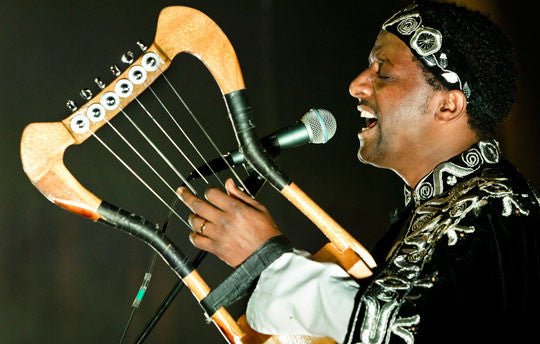Your Cart is Empty

Despite the disaster-laden reports to have come from Ethiopia in recent years, it is one of Africa’s most musically fascinating countries. After shedding its dictatorship in 1991, Ethiopia finally brought an end to thirty year old civil war. These hardships have had a profound effect on Ethiopia’s cultural and musical life. A continuous curfew deprived a whole generation of Ethiopians of a nightlife and censorship restricted song lyrics. Musicians who could emigrate did so. However, all this has changed and recently music feels omnipresent in Addis Ababa.

Traditional music forms the basis of all Ethiopian styles. Most musicians have two repertoires, one modern and one traditional.
The first Western imports were brass bands, brought in by the military under Haile Selassie. Performers tried out their instruments on traditional material and by the late 1940s there were full orchestras to accompany singers, including the Imperial Bodyguard Band and the Haile Selassie Theatre Band.
A characteristic of Ethiopian music is the use of a five-note, pentatonic scale with large intervals between some of the notes. A limping asymmetrical rhythm is also highly characteristic.
Most Ethiopian records were produced between 1969 and 1978. These records represent the golden age of Ethiopian music. Premier league names from this period included Tlahoun Gessesse, Bezunesh Bekele, Hirut Bekele, Mahmoud Ahmed, Ali Birra, and Alemayehu Eshete. Instrumental music’s key figures included Mulatu Astatqé, sole exponent of Ethiojazz, and Getachew Mekurya.
 Swinging Addis is thriving once again, with the distinctive ancient-sounding tones of Ethiopia blending with modern jazz interpretations to create a totally unmistakable fusion. From the legendary innovators Mulatu Astatke and Getatchew Mekuria to today's new generation of artists, this Rough Guide celebrates this burgeoning and most captivating of musical scenes.
Swinging Addis is thriving once again, with the distinctive ancient-sounding tones of Ethiopia blending with modern jazz interpretations to create a totally unmistakable fusion. From the legendary innovators Mulatu Astatke and Getatchew Mekuria to today's new generation of artists, this Rough Guide celebrates this burgeoning and most captivating of musical scenes.
Wax and Gold
During the years of dictatorship in the 1980s, new singers emerged among the veteran artists. Most stayed within the country as it became virtually impossible to emigrate. These artists included Ephrem Tamru, Aster Aweke, Netsanet Mellesse and Amelmal Abate.
From 1985 on, one figure became an idol, Newa Debebe. Debebe renewed interest in the poetic style of sem-enna-werq (wax and gold), an old tradition of double entendre to fool the censors.
New Styles
New Ethiopian talent includes Fikreaddis Nekatibeb, Tigist Bekele, and Afroband. Ethiopian reggae has emerged since the fame of Teddy Afro, but rasta fetishism has no special meaning in Ethiopia.
The modern music scene in Addis Ababa is weak. Nightclubs tend to imitate Western trends. However, you will find a recent phenomenon of azmaribets (hole-in-the-wall clubs) that feature players of krar (lyre), masenqo (one-string fiddle), washnit (flute), and kebero (percussion). These musicians are azmaris, privileged carriers of popular music, mediators of collective memories.
A new generation of talented, non-conformist, sarcastic azmaris has emerged. This new wave is known as bolel. Bolel is a mix of azmari traditions and modern urban culture. Bolel artists include Abbebe Fekad, Enana, Betsat Seyoum, Tedje and Mimi.
Future Shock
Ethiopian musicians are still reeling from the effects of the changes since the establishment of democracy. Travel is easier, so musicians and bands are able to play and record overseas. The opportunity to listen to other music is also beginning to have an effect. Many non-Ethiopian artists have done much to promote Ethiopian music, meaning its future is no longer in the hands of Ethiopian artists alone.
In 2012 Riverboat Records signed the illustrious Ethiopian band Krar Collective. Their excellent album hits stores and digital retailers in September 2012, and is a unique and dynamic debut.
In their current live line-up Krar Collective have between them six open strings on the krar lyre, four smallkebero drum skins, two great lead and one backing vocal. With these minimal of tools, they deliver the most amazing and dynamic live set you’ll hear anywhere. They didn’t bring much more to the studio – a one stringed fiddle (masenqo), a short flute (washint), a bass krar and bags of excitement. In anticipation of the release Krar have been wowing audiences worldwide with their unique sounds.
You can now study these genres through our partner site World Music Method. Click HERE to view the list of courses.